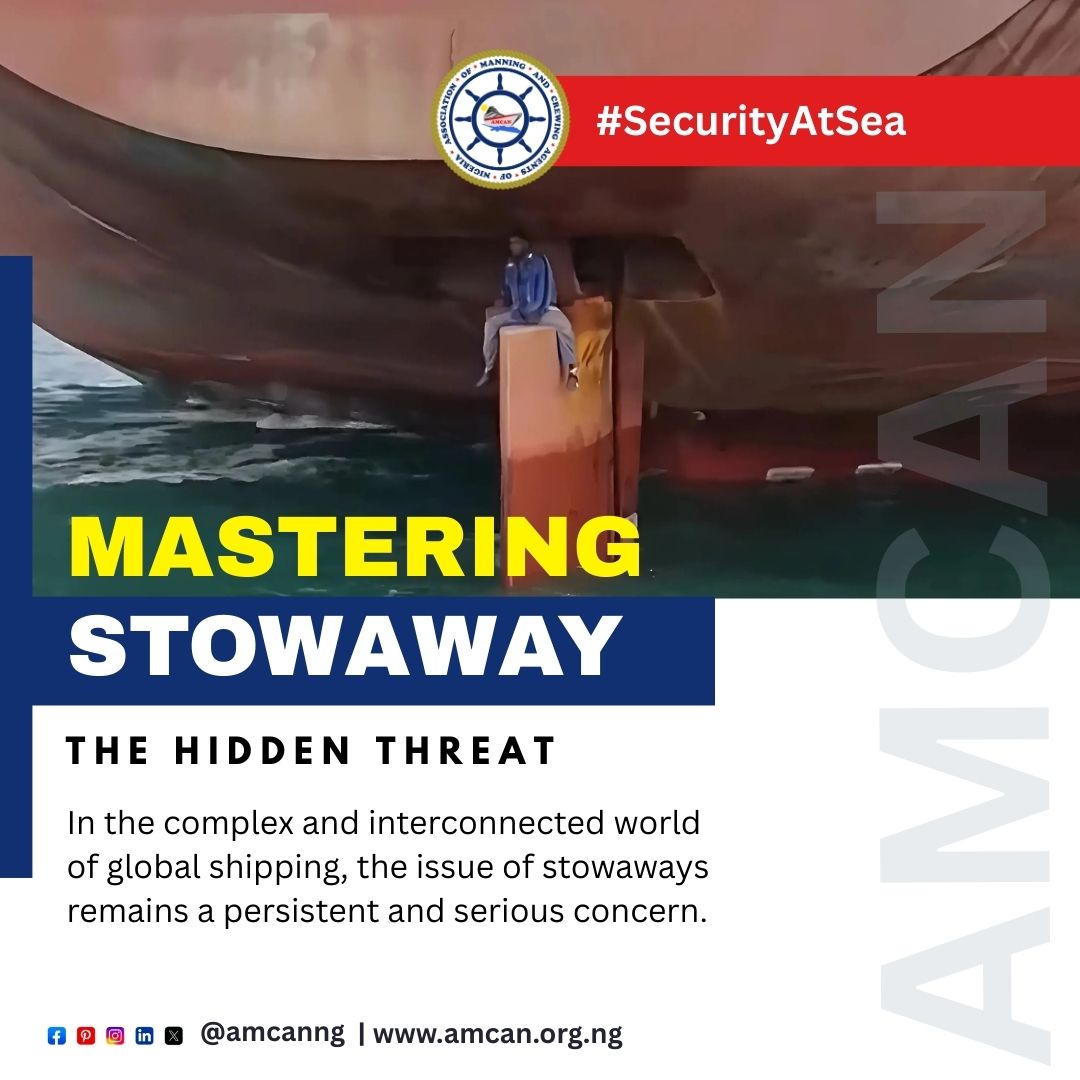Introduction: The Hidden Threat
In the complex and interconnected world of global shipping, the issue of stowaways remains a persistent and serious concern. Stowaways, individuals who conceal themselves aboard a vessel or in cargo without the consent of the shipowner or master, pose significant risks to maritime safety, security, and the well-being of legitimate crew members. Beyond the immediate logistical challenges, stowaways can introduce security threats, health risks, and substantial financial burdens on shipowners. This article delves into the critical importance of thorough stowaway searches, outlines the procedures involved, and highlights the pivotal role of organizations like the Association of Manning and Crewing Agents of Nigeria (AMCAN) in ensuring robust security measures are adhered to by its members.
The Perils of Stowaways: Why Vigilance is Paramount
- Safety and Security Risks: Stowaways can compromise the safety and security of the vessel and its crew. They may interfere with ship operations, damage equipment, or even pose a direct threat to personnel. In some cases, stowaways have been linked to illicit activities, including drug trafficking and terrorism, further escalating the security concerns.
- Health and Humanitarian Concerns: Stowaways often travel in dangerous conditions, lacking adequate food, water, and sanitation. This can lead to severe health issues, including infectious diseases, which can then spread to the crew. Providing medical care and ensuring the humanitarian treatment of stowaways also places a burden on the ship and its crew.
- Legal and Financial Burdens: The presence of stowaways can lead to significant legal and financial repercussions for shipowners. These include fines, repatriation costs, delays in port, and potential criminal charges. The process of disembarking and repatriating stowaways can be complex, time-consuming, and costly, often involving diplomatic negotiations and legal processes.
The Stowaway Search: A Multi-Layered Approach
Effective stowaway prevention and detection require a multi-layered approach, with thorough searches being a cornerstone. The search process typically involves:
1. Pre-departure Search: A comprehensive search of the entire vessel, including cargo holds, accommodation areas, engine room, and all compartments, before departure from port. This is often conducted by trained security personnel, sometimes with the aid of sniffer dogs.
2. During Voyage Vigilance: Crew members are trained to remain vigilant throughout the voyage, reporting any suspicious activities, unusual noises, or sightings of unauthorized persons.
3. Port State Control Inspections: In many jurisdictions, port authorities conduct their own inspections for stowaways, especially in high-risk areas.
AMCAN's Role in Championing Maritime Security
The Association of Manning and Crewing Agents of Nigeria (AMCAN) plays a crucial role in ensuring that its member agencies and, by extension, the vessels they man, adhere to the highest standards of security, including robust stowaway prevention and management. AMCAN's contributions to this effort include:
- Developing and Promoting Best Practices: AMCAN provides comprehensive guidelines and best practices for stowaway searches, prevention, and management, drawing on international regulations and industry standards.
- Training and Certification: AMCAN supports and promotes specialized training programs for seafarers and security personnel on effective search techniques, risk assessment, and legal aspects of stowaway incidents. This includes training on how to conduct thorough searches, identify potential hiding places, and manage stowaways once discovered.
- Collaboration and Advocacy: AMCAN collaborates with national and international maritime authorities, including NIMASA, to advocate for policies and measures that strengthen maritime security and address the root causes of stowaway incidents. This includes working towards more efficient repatriation processes and sharing intelligence on stowaway trends.
- Promoting a Culture of Vigilance: AMCAN emphasizes the importance of a proactive security culture onboard, where every crew member understands their role in maintaining vigilance and reporting suspicious activities. This includes regular drills and awareness campaigns.
Conclusion:
Stowaway incidents remain a persistent challenge for the maritime industry, posing significant risks to safety, security, and financial stability. By implementing rigorous search protocols and fostering a strong security culture, the industry can mitigate these risks. Organizations like AMCAN are instrumental in this effort, ensuring that their members are equipped with the knowledge, training, and best practices necessary to combat the stowaway threat effectively. Through continuous vigilance and collaboration, we can work towards a safer and more secure maritime environment for all.
#MaritimeSecurity #StowawayPrevention #ShipSafety #SeafarerProtection #AMCAN #MaritimeLaw #PortSecurity #GlobalShipping #VesselSecurity #RiskManagement #CrewWelfare #NIMASA


Leave a comment